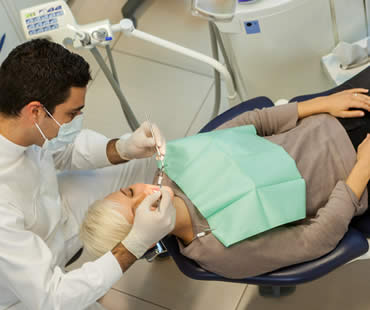
More and more people today are heading to their dentist’s office to brighten their smiles through teeth whitening treatments. Although you can try to maintain white teeth by limiting foods and drinks that stain or stopping habits like smoking, the truth is that teeth are prone to discoloring over time. If you’re considering undergoing teeth whitening, get the facts before you go.
Is teeth whitening safe?:
Most people are able to have their teeth whitened successfully without any issues. However, not everyone has good enough oral health to safely undergo treatment. Healthy teeth and gums are necessary so that the procedure is comfortable and effective. Patients with extensive fillings or crowns may not be the best candidates. Teeth that have extremely dark stains or discolorations from certain things like medications may not attain desired results.
How do I know if I’m a good candidate?:
A complete oral examination by your licensed dentist is the best way to determine if teeth whitening is right for you. During the assessment, your dentist will look for decay, receding gum lines, fillings, enamel condition, tooth sensitivity and more to decide if treatment is advised. Sometimes dental work can be done to restore oral health and then whitening becomes an option.
What is the process?:
Most professional teeth whitening treatments performed in a dental office are done with a high concentration peroxide bleaching agent and enhanced with special lighting to activate the gel. The dentist usually coats your gums with a product to limit sensitivity, and then the bleaching gel is carefully placed onto your teeth. Light is directed to the area, typically in three 15-minutes sessions. The dentist monitors the entire process for your safety and comfort.
What results can I expect?:
It is important to discuss your specific case with your dentist prior to treatment so that you have realistic whitening goals in mind. The degree of whitening often depends on the level and cause of your tooth discoloration. Some patients achieve a couple of shades brighter, while others whiten up to ten shades.
We treat patients from Longview and the surrounding area

You’re not the only one if you feel like your smile has become dull and yellowed. This happens to nearly everyone, and it is the most common complaint that people have about the look of their smiles. There is no reason to live with a discolored smile. Teeth whitening is available to restore your pearly whites.
There are a number of reasons that your smile has changed over the years. Aging causes tooth enamel to thin and allow the yellow-tinged dentin layer to show through. Dark-colored foods and drinks stain teeth, some medications produce the side effect of darkening teeth, and tobacco use creates difficult stains. Teeth may also change color due to mouth trauma.
Whatever the culprit is for your diminished smile, teeth whitening is a simple way to restore it. Whitening products contain bleaching agents that break up stains so that the color is less concentrated and your teeth look brighter. However, teeth whitening does not work in all situations. It does not affect restorations like veneers, fillings or crowns. Whitening is also not usually effective on stains resulting from injury or medications. Yellow teeth are the most likely to respond to teeth whitening, while brown or gray tones might be less improved.
There are numerous options for teeth whitening. Home products are available at your local drugstore like whitening toothpastes, gels, pens, strips and more. These methods focus on removing surface stains from your teeth. At-home bleaching kits are another option, typically obtained from your dentist, that involve filling a mouth tray with a special bleaching solution and wearing the trays for a time period like overnight. These kits are stronger than over-the-counter methods, but not as strong as professional whitening performed in a dental office. It is accomplished in about an hour in the dental chair using a concentrated bleaching agent and special lighting or laser to enhance the process, and provides the most dramatic results.
Consult your dentist for advice on the best whitening methods to use on your teeth. Every patient is different and certain methods may be more effective or comfortable for various people.
If you live in the Longview area contact us today

Kids will be kids, and emergencies happen that can affect the mouth. To avoid long-term damage, extensive pain, or unsightly results, it’s important to know what to do in a dental emergency. Let’s learn what you should do when your child has one of the following common oral problems.
Severe toothache:
Look for food stuck between the teeth, and if so try to dislodge it with floss. Clean the affected tooth and rinse the mouth well with warm water. Swollen gums may indicate an infection, which requires a dental visit. Facial swelling can be relieved with cold compresses, but if it accompanies severe pain you should take your child to the dentist or emergency room. Try giving over-the-counter pain reliever, but don’t place the medication directly on the gum or tooth.
Chipped tooth:
If your child chips a tooth, contact your dentist immediately. Fast action can help save the tooth, reduce the risk of infection, and prevent extensive procedures. Have your child rinse with cold water. If you can find the tooth fragment, take it to the dentist in case it can be bonded back in place.
Knocked out tooth:
The first thing to do is locate the missing tooth. Hold it by the crown instead of the root, and rinse it gently. Try replacing the tooth back in the socket, and have your child bite a piece of gauze or cloth to hold it in place until you get to the dentist. If you can’t insert it, place it in a cup of cold milk to take with you. Time is important in saving a displaced tooth, so see your child’s dentist immediately.
Cut lip, tongue, or cheek:
Ensure your child’s teeth are undamaged, and apply firm pressure with a moist washcloth or teabag to the bleeding area. If it doesn’t stop in fifteen minutes, call your child’s dentist or head to the emergency room. If the tongue is bleeding, there’s not much you can do except wait to see if it stops bleeding on its own within fifteen minutes. If not, visit the dentist or emergency room.
Our dental office is located in Longview

Sedation dentistry is rapidly becoming an extremely popular choice for patients, offering them the best oral care available while providing them with a comfortable, stress-free experience. Benefits exist for both the patient and the dentist, especially for certain patient groups, who may only be able to obtain dental care they need while under some kind of sedation.
Sedation dentistry uses various medications to help the patient relax while undergoing a dental procedure. The sedation allows the patient to be free of fear, anxiety and stress, and in some cases, to have a reduced memory of the treatment itself. This allows for a much more favorable experience, especially when undergoing invasive, extensive or multiple-visit treatments such as extractions, gum surgery, root canals, or some cosmetic dentistry procedures.
Because sedation dentistry is specifically designed to reduce or to alleviate fear and anxiety, the patient is more relaxed during the dental visit. Dentists working on tense or anxious patients are often aware of the problem and have to work with greater care. The removal of this patient tension allows the dentist to work more quickly and surely, leading to a shorter appointment and a more positive experience for both doctor and patient.
Dentists require cooperation from the patient in order to proceed with any dental procedure. Patients who are very young, have special needs, an acute gag reflex, or movement control issues can be extremely challenging for dentists to administer the necessary care. Sedation dentistry can solve this problem, allowing for patients to be cooperative and still, providing the safest, best experience for patient and doctor alike.
Patients who have positive experiences at the dentist are more likely to return for regular dental check-ups. These patients have overall better dental hygiene and tend to have fewer serious dental issues over time. Patients who have good oral care will feel better about their smiles and will be more confident and comfortable throughout the day.
We treat patients from Longview and the surrounding area

Fear and anxiety make dental treatment a challenge for many people. Sedation dentistry offers many options to help patients overcome their fears and experience a more comfortable, relaxing treatment. One of the most common options in sedation dentistry is oral conscious sedation. Here are some common questions about oral conscious sedation and answers about how it can help alleviate your stress about undergoing dental procedures:
- What is oral conscious sedation? This type of sedation utilizes a combination of pain relievers and sedatives to induce an altered state of consciousness that allows you to undergo all kinds of dental treatment in a totally relaxed and comfortable state.
- Am I asleep during the procedure? Patients who receive oral conscious sedation are drowsy but awake and able to communicate with their dental professional. This type of dental sedation allows you to be relaxed but aware.
- Will I feel pain during the dental treatment? With oral conscious sedation, you will most likely not feel any discomfort or pain.
- Is oral conscious sedation safe? While it is considered safe for most patients, your dentist will evaluate your medical and dental health to determine if you are a good candidate for oral sedation.
- Can I resume normal activity immediately after receiving oral sedation? Because you may still be slightly drowsy and under the effects of the medication, it is advised that you arrange to have a friend or family member drive you home after treatment.
- Will I have bad memories of my dental treatment? With oral conscious sedation, you will feel completely relaxed and have little to no memory of your dental procedures.
Thanks to sedation dentistry options like oral conscious sedation, you no longer have to dread or postpone necessary dental treatment due to fear and anxiety. Contact your dentist to find out how they can help you conquer your fears and restore your oral health with this gentle approach to dentistry.
We treat patients from Longview and the surrounding area

Kids don’t always play it safe or make the best decisions when it comes to protecting their teeth. Tooth decay and mouth injuries are just a couple of things parents must worry about for their kids, whether it’s the elementary school or college years. Here are some simple ways that parents can teach their kids to protect their teeth.
Limit sports and energy drinks.
Sports and energy drinks are both heavily marketed toward today’s youth. It is true that sports drinks help replace electrolytes during exercise, but many people drink them too much or outside the exercise realm. Experts have deemed sports drinks to be unnecessary in the lunchroom or as a snack on the playground. The high acid levels in these drinks can erode tooth enamel, with energy drinks determined to cause twice as much damage. It is recommended to save sports drinks for very strenuous activities, and instead stick with water for hydration and refreshment without the negative effects.
Insist upon mouthguards.
Parents should provide mouthguards for kids in nearly any sport, even if it isn’t considered mandatory by the school or team. Mouthguards can prevent chips, fractures, or knockouts of teeth, as well as protect the soft tissues of the mouth. According to research estimates, 3 million teeth were knocked out in youth sports in 2011. Dentists suggest that athletes who don’t wear mouthguards are 60 times more likely to sustain oral injury. Inexpensive basic mouthguards or the boil-and-bite variety are available at sporting goods stores, or customized mouthguards can be purchased through your dentist.
Say no to oral piercings.
Although it applies primarily to teenagers and older, the Academy of General Dentistry advises against oral piercing for active people. Those with piercings should remove them before participating in sports, because puncture wounds can lead to infections related to increased blood flow and breathing rates during exercise. If your child is considering and oral piercing, make sure you discuss the risks and need for removal during physical activity.
If you need a dentist in Longview contact us today









